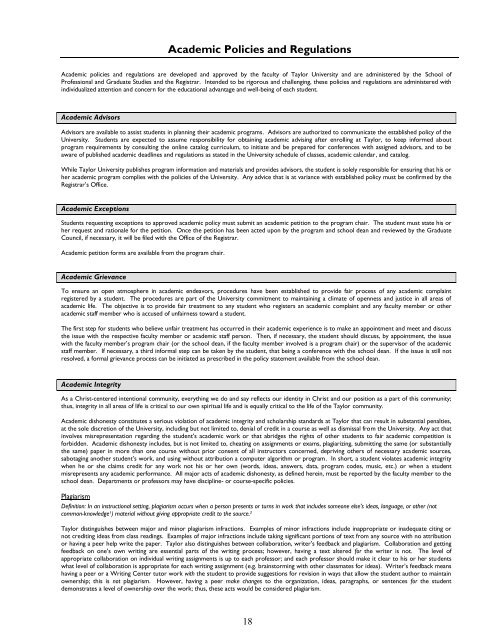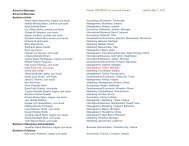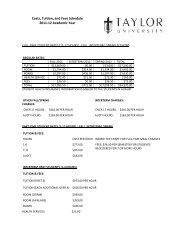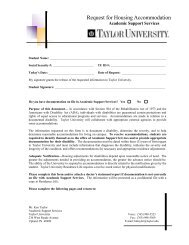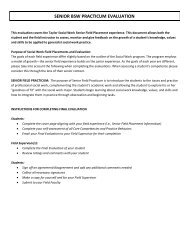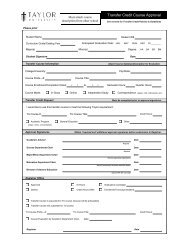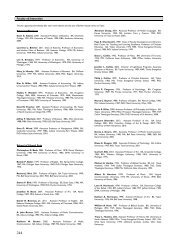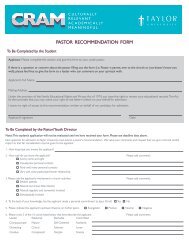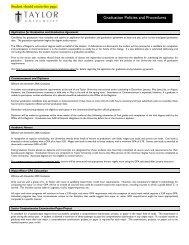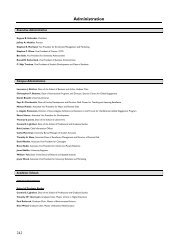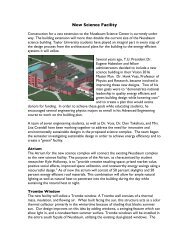Academic Policies and Regulations - Taylor University
Academic Policies and Regulations - Taylor University
Academic Policies and Regulations - Taylor University
Create successful ePaper yourself
Turn your PDF publications into a flip-book with our unique Google optimized e-Paper software.
<strong>Academic</strong> <strong>Policies</strong> <strong>and</strong> <strong>Regulations</strong><br />
<strong>Academic</strong> policies <strong>and</strong> regulations are developed <strong>and</strong> approved by the faculty of <strong>Taylor</strong> <strong>University</strong> <strong>and</strong> are administered by the School of<br />
Professional <strong>and</strong> Graduate Studies <strong>and</strong> the Registrar. Intended to be rigorous <strong>and</strong> challenging, these policies <strong>and</strong> regulations are administered with<br />
individualized attention <strong>and</strong> concern for the educational advantage <strong>and</strong> well-being of each student.<br />
<strong>Academic</strong> Advisors<br />
Advisors are available to assist students in planning their academic programs. Advisors are authorized to communicate the established policy of the<br />
<strong>University</strong>. Students are expected to assume responsibility for obtaining academic advising after enrolling at <strong>Taylor</strong>, to keep informed about<br />
program requirements by consulting the online catalog curriculum, to initiate <strong>and</strong> be prepared for conferences with assigned advisors, <strong>and</strong> to be<br />
aware of published academic deadlines <strong>and</strong> regulations as stated in the <strong>University</strong> schedule of classes, academic calendar, <strong>and</strong> catalog.<br />
While <strong>Taylor</strong> <strong>University</strong> publishes program information <strong>and</strong> materials <strong>and</strong> provides advisors, the student is solely responsible for ensuring that his or<br />
her academic program complies with the policies of the <strong>University</strong>. Any advice that is at variance with established policy must be confirmed by the<br />
Registrar’s Office.<br />
<strong>Academic</strong> Exceptions<br />
Students requesting exceptions to approved academic policy must submit an academic petition to the program chair. The student must state his or<br />
her request <strong>and</strong> rationale for the petition. Once the petition has been acted upon by the program <strong>and</strong> school dean <strong>and</strong> reviewed by the Graduate<br />
Council, if necessary, it will be filed with the Office of the Registrar.<br />
<strong>Academic</strong> petition forms are available from the program chair.<br />
<strong>Academic</strong> Grievance<br />
To ensure an open atmosphere in academic endeavors, procedures have been established to provide fair process of any academic complaint<br />
registered by a student. The procedures are part of the <strong>University</strong> commitment to maintaining a climate of openness <strong>and</strong> justice in all areas of<br />
academic life. The objective is to provide fair treatment to any student who registers an academic complaint <strong>and</strong> any faculty member or other<br />
academic staff member who is accused of unfairness toward a student.<br />
The first step for students who believe unfair treatment has occurred in their academic experience is to make an appointment <strong>and</strong> meet <strong>and</strong> discuss<br />
the issue with the respective faculty member or academic staff person. Then, if necessary, the student should discuss, by appointment, the issue<br />
with the faculty member’s program chair (or the school dean, if the faculty member involved is a program chair) or the supervisor of the academic<br />
staff member. If necessary, a third informal step can be taken by the student, that being a conference with the school dean. If the issue is still not<br />
resolved, a formal grievance process can be initiated as prescribed in the policy statement available from the school dean.<br />
<strong>Academic</strong> Integrity<br />
As a Christ-centered intentional community, everything we do <strong>and</strong> say reflects our identity in Christ <strong>and</strong> our position as a part of this community;<br />
thus, integrity in all areas of life is critical to our own spiritual life <strong>and</strong> is equally critical to the life of the <strong>Taylor</strong> community.<br />
<strong>Academic</strong> dishonesty constitutes a serious violation of academic integrity <strong>and</strong> scholarship st<strong>and</strong>ards at <strong>Taylor</strong> that can result in substantial penalties,<br />
at the sole discretion of the <strong>University</strong>, including but not limited to, denial of credit in a course as well as dismissal from the <strong>University</strong>. Any act that<br />
involves misrepresentation regarding the student’s academic work or that abridges the rights of other students to fair academic competition is<br />
forbidden. <strong>Academic</strong> dishonesty includes, but is not limited to, cheating on assignments or exams, plagiarizing, submitting the same (or substantially<br />
the same) paper in more than one course without prior consent of all instructors concerned, depriving others of necessary academic sources,<br />
sabotaging another student’s work, <strong>and</strong> using without attribution a computer algorithm or program. In short, a student violates academic integrity<br />
when he or she claims credit for any work not his or her own (words, ideas, answers, data, program codes, music, etc.) or when a student<br />
misrepresents any academic performance. All major acts of academic dishonesty, as defined herein, must be reported by the faculty member to the<br />
school dean. Departments or professors may have discipline- or course-specific policies.<br />
Plagiarism<br />
Definition: In an instructional setting, plagiarism occurs when a person presents or turns in work that includes someone else’s ideas, language, or other (not<br />
common-knowledge¹) material without giving appropriate credit to the source.²<br />
<strong>Taylor</strong> distinguishes between major <strong>and</strong> minor plagiarism infractions. Examples of minor infractions include inappropriate or inadequate citing or<br />
not crediting ideas from class readings. Examples of major infractions include taking significant portions of text from any source with no attribution<br />
or having a peer help write the paper. <strong>Taylor</strong> also distinguishes between collaboration, writer’s feedback <strong>and</strong> plagiarism. Collaboration <strong>and</strong> getting<br />
feedback on one’s own writing are essential parts of the writing process; however, having a text altered for the writer is not. The level of<br />
appropriate collaboration on individual writing assignments is up to each professor; <strong>and</strong> each professor should make it clear to his or her students<br />
what level of collaboration is appropriate for each writing assignment (e.g. brainstorming with other classmates for ideas). Writer’s feedback means<br />
having a peer or a Writing Center tutor work with the student to provide suggestions for revision in ways that allow the student author to maintain<br />
ownership; this is not plagiarism. However, having a peer make changes to the organization, ideas, paragraphs, or sentences for the student<br />
demonstrates a level of ownership over the work; thus, these acts would be considered plagiarism.<br />
18
Plagiarism Policy: All major acts of plagiarism must be reported by the faculty member to the appropriate academic school dean. The student <strong>and</strong><br />
faculty member involved will receive a copy of the completed plagiarism incident report. All incident reports will be archived in both the academic<br />
School <strong>and</strong> will be viewed <strong>and</strong> used solely by the dean of this office to track plagiarism incidents in order to catch patterns of behavior. This tracking<br />
will affect student consequences for any additional plagiarism incidents reported <strong>and</strong> may affect recommendations for off-campus student activity<br />
participation. Plagiarism records in the academic school office will be destroyed along with all other student records according to their respective<br />
policies.<br />
¹ Common knowledge means any knowledge or facts that could be found in multiple places or as defined by a discipline, department, or faculty member.<br />
² Adapted from the Writing Program Administrators’ “Defining <strong>and</strong> Avoiding Plagiarism: The WPA Statement on Best Practices.” http://www.wpacouncil.org<br />
<strong>Academic</strong> Load<br />
Term<br />
Registration for 9 credit hours during the term constitutes full-time enrollment status for graduate programs. A student may register for no more<br />
than 13 credit hours per term. Some programs may allow additional credit hours with faculty advisor approval.<br />
Interterm<br />
Registration for 3-4 hours is considered a normal load for January interterm.<br />
<strong>Academic</strong> Progress Policy<br />
A student who meets the minimal GPA requirements as indicated in the chart below is considered to be a student in good academic st<strong>and</strong>ing. A<br />
student who falls below the minimum required hours <strong>and</strong> GPA is placed on academic probation. Notification of academic st<strong>and</strong>ing will be sent by<br />
the Registrar to students <strong>and</strong> their advisors through e-mail <strong>and</strong> letters will be mailed to students’ permanent addresses within one week following<br />
submission of final grades by faculty.<br />
Cumulative Graduate<br />
Earned Hours<br />
00.01+ 3.00<br />
Minimum Graduate<br />
Required GPA<br />
The faculty, staff, <strong>and</strong> administration of <strong>Taylor</strong> <strong>University</strong> are committed to helping students be successful in their personal, spiritual, <strong>and</strong> intellectual<br />
lives. As such, the GPA of each student is reviewed at the end of each term to determine whether action needs to be taken with respect to<br />
probationary status.<br />
Students placed on probation have one term in which to meet good academic st<strong>and</strong>ing as indicated in the chart above. Reevaluation does not take<br />
place after January terms. Failure to reach the minimum requirements in the following term results in suspension from the <strong>University</strong>. However,<br />
students who earn a 3.00 term GPA may be placed on extended probation <strong>and</strong> allowed to remain at the institution for the subsequent term.<br />
Students on extended probation are not eligible to receive financial aid.<br />
Students on extended probation failing to make satisfactory progress may be suspended at the discretion of the program chair. Readmission is not<br />
automatic <strong>and</strong> requires the approval of several offices on campus, starting with the graduate program. Students must present evidence that they are<br />
academically prepared to return to <strong>Taylor</strong>. Additionally, readmitted students will be placed on extended probation <strong>and</strong> are not eligible for financial<br />
aid during the return term.<br />
<strong>Academic</strong> probation <strong>and</strong> suspension carry additional related consequences:<br />
Eligibility for financial aid is affected by academic st<strong>and</strong>ing. Probationary <strong>and</strong> suspended students should check with the Office of Financial<br />
Aid regarding academic progress regulations pertaining to their financial aid.<br />
In some cases, it may be advisable for a suspended student to enroll in courses at another institution in order to demonstrate that he or<br />
she is prepared to achieve better academic work prior to readmission to <strong>Taylor</strong>. Students should consult with the program chair <strong>and</strong><br />
Registrar in advance of such enrollment.<br />
Contact the Office of the Registrar for additional information regarding academic progress.<br />
Class Attendance<br />
Students are expected to attend all sessions of classes for which they are registered. Any necessary deviations from this expectation must be<br />
approved in advance by the professor of the class to be missed. Each professor will determine penalties for missing class <strong>and</strong> indicate this in the<br />
syllabus.<br />
19
.<br />
Experiential Education<br />
Experiential education includes practicum<br />
experiences, internships, <strong>and</strong> field <strong>and</strong> travel studies<br />
providing students with the opportunity to integrate<br />
theoretical learning in a field of study with actual work<br />
experience in a variety of non-classroom settings. Students<br />
should consult with academic departments <strong>and</strong><br />
supervising faculty for departmental policies, guidelines,<br />
<strong>and</strong> responsibilities.<br />
Field <strong>and</strong> Travel Study<br />
Field <strong>and</strong> travel study experiences are usually<br />
a component of a regular course <strong>and</strong><br />
provide students opportunities to learn,<br />
observe, <strong>and</strong> assist professionals with<br />
selected tasks in an off-campus setting<br />
related to a career or program goal.<br />
Students are placed, supervised,<br />
<strong>and</strong> evaluated by the faculty<br />
responsible for the course.<br />
Assignments related to field<br />
experiences become part<br />
of the overall course<br />
evaluation.<br />
<strong>Academic</strong> credit is<br />
given for field<br />
<strong>and</strong> travel<br />
studies;<br />
therefore, the<br />
tuition for a<br />
field or travel<br />
study is the<br />
same as for a<br />
regular graduate course <strong>and</strong> is based on the number of credit<br />
hours. Tuition for a field or travel study completed during the<br />
summer is billed at the st<strong>and</strong>ard summer session credit hour rate<br />
for graduate courses. Additional fees may be incurred.<br />
The <strong>Taylor</strong> MBA Program requires all students to complete<br />
MKT 515 Global Business Study Tour which requires<br />
international travel. MBA students experience variations<br />
in business <strong>and</strong> industry sectors <strong>and</strong> cultural<br />
differences first-h<strong>and</strong> by visiting other global<br />
markets. Tours include a combination of business<br />
<strong>and</strong> corporate meetings with visits to historic sites<br />
<strong>and</strong> the unique communities of selected<br />
countries. Particular emphasis is given to<br />
identifying cultural differences in values,<br />
customs, attitudes <strong>and</strong> behaviors that<br />
impact the marketplace <strong>and</strong><br />
organizational environments. MBA<br />
students are encouraged to<br />
explore <strong>and</strong> examine particular<br />
areas of business interest<br />
during the study tour <strong>and</strong><br />
while completing course<br />
requirements. Recent<br />
global study tours<br />
have included<br />
visits to several<br />
countries in<br />
Europe,<br />
Hong Kong,<br />
Taiwan, <strong>and</strong><br />
mainl<strong>and</strong><br />
China.<br />
Grade Changes<br />
All requests for change of grade (except from an INC or NR) are initiated by the student with the professor of record <strong>and</strong> then must be approved<br />
by the program chair <strong>and</strong> the school dean. Questions regarding the grade should be directed to the instructor within two weeks after being posted<br />
on TOWER. Such a change is permitted only before the end of the next term after the original grade was awarded.<br />
Acceptance of late or missing assignments after the end of a term does not qualify for a change of grade.<br />
Grades for Repeated Courses<br />
Any course may be repeated at <strong>Taylor</strong> <strong>University</strong>. All attempts in a course are reflected on the student’s academic transcript; the cumulative GPA<br />
will reflect the most recent grade in the repeated course, even if the new grade is lower than the original attempt.<br />
Grades of W (withdrawn), WP (withdrawn/passing), or AUD (audit) will not replace previously earned grades of A-F, WF (withdrawn/failing), or<br />
NC (no credit) in the GPA calculation. Duplicate credit hours are not awarded when repeating a course.<br />
Grade Reports<br />
Allow approximately one week after the last final exam for calculating <strong>and</strong> posting of final grades. Grade reports will not be mailed from the<br />
Registrar’s Office. For information on accessing TOWER, students should visit http://www.taylor.edu/academics/registrar/tower.shtml.<br />
20
Grading System<br />
The following grades <strong>and</strong> quality points are assigned to graduate students at <strong>Taylor</strong> <strong>University</strong> in calculating the GPA:<br />
Grade Meaning Quality Points Calculated in GPA<br />
A Superior 4.00 Yes<br />
A- 3.67 Yes<br />
B+ 3.33 Yes<br />
B Satisfactory 3.00 Yes<br />
B- 2.67 Yes<br />
C+ 2.33 Yes<br />
C Poor 2.00 Yes<br />
C- 1.67 Yes<br />
F Failing 0 Yes<br />
P Pass (C- or above) 0 No<br />
CR Credit 0 No<br />
W Withdrawn 0 No<br />
WP Withdrawn/passing 0 No<br />
WF Withdrawn/failing 0 Yes<br />
INC Incomplete 0 No<br />
NR Grade not reported 0 No<br />
NC No Credit/failing 0 Yes<br />
AUD Audit 0 No<br />
The unit of credit is the semester hour. Grade point average (GPA) is calculated by dividing quality points by GPA hours. Grade point hours<br />
include only <strong>Taylor</strong> <strong>University</strong> courses taken for a grade.<br />
Incomplete <strong>and</strong> Not Reported Grades<br />
All work for credit is expected to be completed within the term it is attempted including independent studies, tutorials, <strong>and</strong> experiential education.<br />
An incomplete grade (INC) may only be given when an emergency prevents a student who has been passing the course from completing some<br />
crucial portion of the required work.<br />
Incompletes should be initiated by the instructor of record prior to the final exam week <strong>and</strong> must be authorized by the appropriate school dean<br />
before they are submitted to the Office of the Registrar. Incompletes should be converted to grades <strong>and</strong> reported to the Registrar by the date<br />
approved.<br />
The Registrar will record an NR (grade not reported) when grades are unavailable. If no change has been made by the instructor by the approved<br />
due date, the Registrar is authorized to change the INC or NR to a grade of F.<br />
Independent Study Policy<br />
Independent studies are individualized, directed studies taken without classroom instruction or regular interaction with a faculty member. The<br />
student is required to plan with the professor an individualized schedule of reading, research, <strong>and</strong> study. Assignments, papers, tests, <strong>and</strong> other<br />
means of assessment may be completed by appointment, mail, e-mail, remote proctors, internet, etc.<br />
Independent studies are considered exceptions due to faculty workload limitations, but may be approved under certain circumstances, such as:<br />
1. To complete a program requirement without which the student’s graduation would be unreasonably delayed. (A student’s desire to graduate<br />
early does not meet this requirement.)<br />
2. To resolve scheduling conflicts beyond the student’s control involving required courses which cannot be taken in a later term without<br />
negative impacts on the student’s program of study.<br />
3. To provide a scheduling efficiency or convenience to the <strong>University</strong>, such as offering the independent study as an alternative to a lowenrollment<br />
class section, deviating from regular course offering schedules, etc.<br />
4. To offer both the student <strong>and</strong> supervising faculty member the opportunity to exp<strong>and</strong> their <strong>Taylor</strong> experiences with special/advanced topic<br />
courses that may serve special needs such as specific career goals. An additional independent study fee may be assessed by the academic<br />
dean for these requests.<br />
All independent studies are subject to faculty <strong>and</strong> program approval. Other academic policies in this catalog apply to independent studies (e.g.<br />
criteria for requesting incomplete grades, deadlines for registration).<br />
Registration forms for independent study are available online at http://www.taylor.edu/academics/registrar. For additional information, please refer<br />
to the Registration section of this catalog.<br />
21
Intellectual Property Policy<br />
The <strong>Taylor</strong> <strong>University</strong> Intellectual Property Policy designates that students retain copyright to most creative work for which they are solely<br />
responsible. Exceptions can include work done while employed by the <strong>University</strong> or under other extenuating circumstances. Although students<br />
retain intellectual property rights to most creative work submitted for academic credit, matriculation in the <strong>University</strong> entails an obligation for<br />
students to allow their writing or similar creative work to be used for <strong>University</strong> academic assessment. Procedures will be followed to preserve<br />
the anonymity of students for such assessment. The content <strong>and</strong> analysis of student writing or similar creative work selected for assessment will be<br />
used primarily for internal review of academic programs. Observations <strong>and</strong> derivative findings from such analysis may be reported to accreditation<br />
agencies or disseminated through professional publication but without reference to the authorship of individual students.<br />
TOWER Online Access System<br />
<strong>Taylor</strong> Online Web Enabled Records (TOWER) provides students secure online access to their academic records, including<br />
grades, unofficial transcripts, <strong>and</strong> course registration, Additional information on accessing TOWER is available online at<br />
http://www.taylor.edu/academics/registrar/tower.shtml.<br />
Transfer Credit Policy<br />
The guidelines for accepting transfer credit are as follows:<br />
<strong>Taylor</strong> <strong>University</strong> reserves the right to accept or reject<br />
courses for transfer credit.<br />
Courses older than 7 years are generally not accepted.<br />
Only credits taken at an accredited college may be<br />
accepted for transfer credit.<br />
Only course work with a grade of B- or better will be<br />
accepted. Although a minimum grade is required, grades<br />
do not transfer. The student’s GPA is computed only on<br />
work offered by or through <strong>Taylor</strong> <strong>University</strong>.<br />
Transfer credit will not be accepted <strong>and</strong> duplicate hours<br />
will not be awarded for equivalent courses previously<br />
earned with a passing grade at <strong>Taylor</strong>. However, the<br />
grade on the transfer institution’s transcript may be used<br />
to validate completion of the course to meet a curriculum<br />
requirement with the required grade. Students attempting<br />
to raise their cumulative GPAs must repeat the respective<br />
course(s) at <strong>Taylor</strong>.<br />
The maximum number of transfer credits accepted varies<br />
by program <strong>and</strong> will not exceed 9 credit hours.<br />
The Graduate Director <strong>and</strong> Director of Teacher<br />
Certification must approve courses that apply toward<br />
teacher certification.<br />
New Students<br />
To receive credit for course work earned at other accredited universities, new students should request that transcripts be sent directly to the<br />
Graduate Office at <strong>Taylor</strong> <strong>University</strong>. These transcripts are then forwarded to the program chair for transfer credit evaluation who sends the<br />
transcripts on to the Office of the Registrar; a copy of the evaluation is sent to the student. Course descriptions <strong>and</strong> syllabi may be required in<br />
order to evaluate transfer courses.<br />
Current Students<br />
After enrolling at <strong>Taylor</strong>, students who plan to take a course at another university during the summer or during a term’s absence, <strong>and</strong> wish to<br />
transfer credit to apply toward a degree must complete a transfer credit course approval form signed by the program chair <strong>and</strong> the Registrar prior<br />
to enrolling in the course. Upon completion of the course, students should request that transcripts be sent directly to the Office of the Registrar at<br />
<strong>Taylor</strong>. Transfer credit course approval forms are available online at http://www.taylor.edu/academics/registrar/forms.shtml.<br />
Transcript of <strong>Academic</strong> Record<br />
In accordance with the Family Educational Rights <strong>and</strong> Privacy Act of 1974 (FERPA), transcripts may not be released without the written consent of the<br />
student. Students should submit a “Transcript Request Form” available online or from the Office of the Registrar, have the request form approved<br />
by the Bursar, <strong>and</strong> return the completed form to the Registrar’s Office for processing. No transcript will be released unless all financial obligations<br />
to the <strong>University</strong> have been fulfilled according to an agreement with the Office of the Bursar.<br />
Students may view an unofficial copy of their academic transcript via their TOWER accounts, provided all financial obligations to the <strong>University</strong> have<br />
been fulfilled. This abstract is useful to students <strong>and</strong> academic advisors only; it is not an official transcript of academic record. Official transcripts<br />
must be requested from the Office of the Registrar.<br />
Additional transcript information <strong>and</strong> instructions are available at http://www.taylor.edu/academics/registrar/transcripts.shtml.<br />
TUAlert Emergency Messaging System<br />
The TUAlert emergency messaging system will allow <strong>Taylor</strong> <strong>University</strong> to immediately notify on campus students <strong>and</strong> employees of impending lifethreatening<br />
or life-altering situations including rapidly-developing, life-threatening criminal activity on campus <strong>and</strong> imminent severe weather activity.<br />
The system utilizes Wireless Emergency Notification System (WENS) technology <strong>and</strong> can send text messages to cell phones <strong>and</strong> e-mail messages to<br />
accounts of <strong>Taylor</strong>'s students <strong>and</strong> employees. TUAlert will never be used for advertising or spam.<br />
Students may sign up for TUAlert at http://entry.inspironlogistics.com/taylor/wens.cfm?ep_id=student. Employees may sign up for TUAlert at<br />
http://entry.inspironlogistics.com/taylor/wens.cfm?ep_id=employee.<br />
22
Undergraduate Credit <strong>and</strong> Students<br />
With the approval of the relevant graduate department, 6 hours of graduate credit may be taken before the awarding of an undergraduate degree.<br />
Undergraduate courses cannot be used toward meeting graduate requirements.<br />
<strong>University</strong> Communication Policy<br />
<strong>Taylor</strong> <strong>University</strong> uses @taylor.edu student e-mail addresses to communicate directives relating to academic progress, advising, registration, billing,<br />
financial aid, etc. to students, faculty, <strong>and</strong> staff.<br />
Students are responsible for checking their <strong>Taylor</strong> e-mail accounts regularly <strong>and</strong> complying with correspondence received from advisors, professors,<br />
<strong>and</strong> <strong>University</strong> administrators.<br />
<strong>University</strong> Withdrawal<br />
Students who decide they cannot attend <strong>Taylor</strong> after enrollment in courses for the next term <strong>and</strong> prior to the start of that term must notify the appropriate<br />
graduate program office <strong>and</strong> the Registrar’s Office. Students failing to request withdrawal from the <strong>University</strong> risk receiving failing grades in their<br />
courses <strong>and</strong> being financially responsible for tuition <strong>and</strong> fees.<br />
Students who find it necessary to withdraw from all credit classes after the term begins must apply for formal withdrawal by filling out the withdrawal<br />
form <strong>and</strong> taking it to the appropriate offices noted on the form. Students not on campus should contact the department to inquire of steps for<br />
formally withdrawing. If a student withdraws from the <strong>University</strong> after the first week of classes (first five class days), he or she will receive a<br />
withdrawal grade (W, WP, WF) for the appropriate withdrawal deadline. If this procedure is not followed, failing grades may be assigned. Failure<br />
to complete the term does not cancel the student’s obligation to pay tuition <strong>and</strong> other charges. For specific details on refunds <strong>and</strong> adjustments,<br />
refer to the Finance section of this catalog on pages 41-42.<br />
Students withdrawing with the intent to return to <strong>Taylor</strong> must initiate the withdrawal process through the Registrar’s Office <strong>and</strong> apply for readmission<br />
through the office of the appropriate graduate program. Students planning to take courses at another institution during their time away from<br />
<strong>Taylor</strong> <strong>University</strong> should submit transfer credit request forms to the Office of the Registrar <strong>and</strong> the program chair before registering for courses at<br />
the other university to ensure proper credit will be granted by <strong>Taylor</strong>.<br />
Students with no intent to return to <strong>Taylor</strong> for the next term must apply for formal withdrawal through the Registrar’s Office <strong>and</strong> the appropriate<br />
graduate program office before leaving campus (prior to exam week).<br />
23


